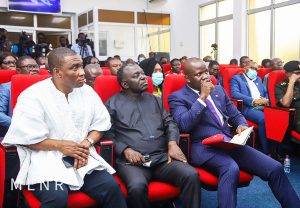
Large scale mining companies in the country have been asked to list on the Ghana Stock Exchange, following the government’s objective to indigenise the mining industry and ensure the active participation of Ghanaians in the industry.
The Minister for Lands and Natural Resources, Mr. Samuel Abu Jinapor, has disclosed that his outfit has completed a framework to guide the listing of mining companies on the stock exchange, as Ashanti Gold has been listed already.
MINING
According to him, the minerals and mining regulations was promulgated in 2020, in effecting the cause of promoting job creation through the use of local expertise, which has provided direct and indirect jobs to some three (3) million people across the 16 regions.
Speaking at a press conference in Accra yesterday, Mr. Jinapor recounted that the sector has retained its position as the leading source of export revenue, with export receipts from the sale of minerals reaching some Seven Million US Dollars (US$7,000,000.00) in 2020.
“We increased the procurement list reserved for Ghanaians from twenty-nine to forty-one, including goods like lubricants, grinding media, electrical cables and services like contract mining, drilling services for surface operations, warehousing, freight forwarding and geophysical services.” he stated.
In the improvement of service delivery, the minister assured the media that the Minerals Commission is constructing new Regional and District Offices to augment service delivery in the region.
Two Offices in Bibiani and Akim Oda are almost complete and two Regional officers in Tamale and Kumasi are underway, with Wa and Bolga due to commence before the end of the year.
He further stated that the government has supported the Minerals Commission with logistics in the form of 20 pick-up vehicles, 10 blast monitors, 107 desktop computers, 68 laptops, 19 printers, 11 photocopier machines, 102 uninterruptible power supply (UPS), five scanners, three projectors, three survey equipment, two plotters and one backup storage device to support the operations of the commission.
In lieu of small scale mining, the ministry, according to Mr. Jinapor, has procured five patrol boats which will be used by the security services to patrol and protect our rivers.
He continued that, his outfit has commissioned mercury-free gold processing equipment, known as Gold Kacha, to help small scale miners extract gold from the ore without the use of mercury.
FORESTRY
The Minister indicated yesterday that, his outfit has placed an outright ban on the harvesting, salvaging, trading, exporting and importing of Rose wood, whilst suspending all reconnaissance, prospecting and exploration activities in forest reserves.
According to him, the Forestry Commission has established a rapid response team, working with other security agencies, to ensure strict compliance with these bans and to clamp down on all illegal logging activities.
He continued that “we are also undertaking policy and legislative reforms to strengthen forest law enforcement. We have, therefore, laid before parliament a Wildlife Bill to revise and consolidate the laws relating to wildlife and protected areas to bring them in conformity with existing policies in the sector.
“We are also implementing the Joint Framework for Action, which we signed in 2017 with thirty-six cocoa and chocolate producing companies under the Cocoa and Forests Initiative (CFI), to halt deforestation and forest degradation in the cocoa value chain. We have just completed the 2021 Annual Report and an Implementation Plan for 2022 to 2025.”
In furtherance of this, he said his ministry has launched two programmes; the Ghana Cocoa Forest REDD+ programme (GCFRP) and the Ghana Shea Landscape Emission Reductions Project, to restore our lost forest cover in the High Forest Zone, increase cocoa yields and reduce Green House Gas Emissions and to increase the shea tree population in the Savannah Ecological Zone, restore degraded lands, create small and medium enterprises for women in the shea value chain and reduce carbon emissions respectively.
Mr. Jinapor reminded the press that just as the Green Ghana Day was successful with over seven million trees planted last year and twenty-five million this year, due to the full participation of the Ghanaian citizen and the media, the ministry is once again embarking on similar venture.
GREEN STREET PROJECT
He mentioned that there will be an inauguration of a National Planning Committee to implement the Green Street Project, which according to him, is intended to plant trees in the median and avenues of the regional capitals of our country.
In addition to that, the forestry commission has developed eighty-seven hectares of Rosewood Plantation in eight Forest Districts namely, Tamale, Buipe, Bole, Yendi, Kintampo, Sunyani, Offinso and Nkawie, as part of measures to prevent the extinction of the wood species.
The lands minister remarked that his outfit would continue to adopt and implement policies necessary for the effective protection, preservation and utilisation of the lands and natural resources of our country.
LAND
Also, the minister emphasised that land remains one of the main catalysts for development, thus building an effective, transparent, responsive and orderly land administration, which is steeped in integrity.
This, he said, six key developments have taken place in the land sector, which includes digitalisation of administration services to support government in achieving expeditious land service delivery across the country.
As part of the new land transformation reforms, the minister noted that the data capture activities which include manual records data entry, scanning and digitizing of map sheets continue unabated.
Mr. Abu Jinapor continued that the Lands Commission is also decentralising its services to bring it closer to those who access these services.
“These include the provision of offices for the six (6) newly created regions, which all now have Regional Lands Commissions. Though not fully completed, the temporary offices have been provided for these Regions to commence operations. With this, clients within the Regions have since been accessing the services of the Commission conveniently,” he added.
Another development which has taken place in the sector, according to the minister, is a comprehensive sensitisation on the Land Act 2020 (Act 1036) since its passage, has embarked on various sensitisation activities that would support efficient implementation of the Act.
“These include engagement with traditional authorities, civil society organisations, religious bodies, the media and government agencies, to educate them on key provisions in the Act. Plans are advanced to begin the drafting of the various Legislative Instruments required to operationalise certain parts of the Act.”
The ministry has also constituted a Public Lands Protection Team, chaired by the Deputy Minister, Benito Owusu, to work with the Lands Commission to protect public lands from encroachment, and recover those that have already been encroached.
This, he said, “under section 236 of the Land Act, 2020 (Act 1036), not only is the unauthorised occupation or transfer of public lands illegal and unlawful, it is also a criminal offence punishable by a fine of up to One Hundred and Twenty Thousand Ghana Cedis (GHS120,000) or a term of imprisonment of up to fifteen (15) years.”
Furthermore, the Office of the Administrator of Stool Lands, in accordance with article 267 of our national Constitution, continues to mobilise and disburse stool revenue to stated beneficiaries, namely stools or skins, traditional authorities and the Metropolitan Municipal and District Assemblies (MMDAs), the minister stated.
Also, some of these revenues have been utilised in the provision of CHIPS Compound, schools, portable water, markets, and other social amenities.
The Minister of Lands and Natural resources included by reinstating that the Ghana Boundary Commission, guided by the principle of good neighborliness, continues to engage neighbors to delineate and demarcate the country’s boundaries and protect the land and maritime boundaries of the country.
By Love Wilhelmina Abanonave & Jennifer Ambolley








